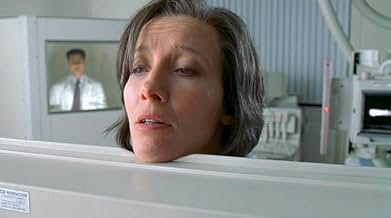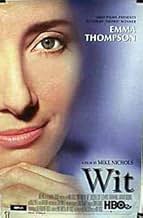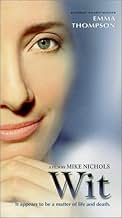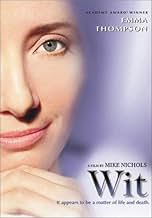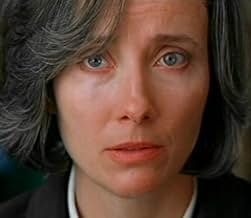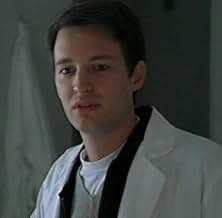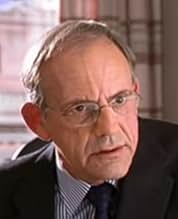अपनी भाषा में प्लॉट जोड़ेंA renowned professor is forced to reassess her life when she is diagnosed with terminal ovarian cancer.A renowned professor is forced to reassess her life when she is diagnosed with terminal ovarian cancer.A renowned professor is forced to reassess her life when she is diagnosed with terminal ovarian cancer.
- निर्देशक
- लेखक
- स्टार
- 3 प्राइमटाइम एमी जीते
- 13 जीत और कुल 21 नामांकन
- Nurse
- (as Su-Lin Looi)
- Fellow 1
- (as Harry Dillon)
फ़ीचर्ड समीक्षाएं
Six years ago I invited the ten medical students in my history taking group to view the film together in a setting away from the school. I have since repeated this twice yearly with each of the small groups under my charge. I made one big mistake the first year. After the movie ended I turned on the lights while the credits were running, oblivious to the sniffing and outright weeping on the part of the freshman medical students. Since then I've permitted the credits to run completely before turning on the lights. There is generally a delay of up to five minutes before any of them are able to say anything.
The student response has been uniform. Gratitude for having seen the film, awe of the realities of the profession they have chosen to enter and appreciation for the chance to come to a deeper understanding of their own selves and motivations for entering medical school.
Eileen Atkins is absolutely superb as Evelyn Ashford, PhD. Her scenes are brief but they bring the deeply religious underpinnings of the film to the fore. Her first scene, in which she recites the final stanza of Donne's Holy Sonnett X, (a scene which gave the movie its title) contrasts with the tender love in Vivian's hospital room. Her reciting of the poetry is astonishing. It was not until the sixth or so viewing (I've lost count) that I realized her parting words, "May the angels lead you to Paradise. . . " were the English translation of In Paradisum from the Roman Catholic funeral liturgy. That was one time when my tears joined the students.
Anyone working in medicine; students, residents, nurses and nursing students, aides and so on, should watch this movie. I generally used the class the day following the viewing for a discussion of the movie, the bedside manner of the docs, nurses, techs and so on as well as what feelings the movie stirred in them. The conversations have been memorable.
This is a movie that is not to be missed. It is tragic that it was made for television by HBO rather than given general theatrical release. Many fewer people have seen it is a result.
By Blake French:
"Wit" is one of the most personal stories of terminal illness that I can remember. Most of the movie takes place behind hospital doors where the film's main character is tested and treated for advanced stages of ovarian cancer-that may be the reason that it was released straight to cable TV instead of getting a much deserved theatrical release. Do not let the depressing themes stop you from viewing "Wit," it is thought-provoking, riveting, unforgettable-one of the best movies of the year.
The film is directed by Mike Nichols (whose most memorable work is the original classic, "The Graduate"). He is at the top of his game here, vividly focused and, working for a script by himself and Emma Thompson, uses a narrative of the first person. The main character, a strict professor of poety in her upper forties named Vivian Bearing, often talks directly to the camera, incorporating a straightforward point of view as she shares her personal feelings directly. This gives the movie a personal dimension, and the soundtrack, consisting of memorable classical music, contributes to the penetrating power of this superb motion picture.
Since the production never had a theatrical release, it will not be eligible for Academy Awards next March. That is a shame, because the work by Emma Thompson is more invigorating, emotional, and involving as anything we are likely to see this year. She delivers a performance of awe-inducing empathy, doing something many actresses would have trouble dealing with. She plays a tough individual, both physically and emotionally, but, as the movie's clear irony proves, even the strongest people have a breaking point, and when she reaches hers, she loses confidence in her past and current strengths. Thompson is heartbreaking and vivid, creating one of the most convincing and noteworthy characters in a long time.
Christopher Lloyd plays Dr. Harvey Kelekian, the person in charge of Ms. Bearing's treatments. It is clear this man is more concerned about the results of the tests then the actual person being tested. Bearing becomes a mere guinea pig, and as she states in one of the movie's most powerful scenes, she is unbearably ill not because he has advanced stages of ovarian cancer, but because she is being treated for advanced stages of ovarian cancer. It is the actual treatments that are a threat to her health. Eileen Atkins plays a sympathetic nurse who sees Bearing as more than just a patient, but a person. Jonathan M. Woodward delivers a powerful performance as another hospital worker more interesting in numbers than people.
"Wit" is a powerful, harrowing movie not to be missed. It aired on HBO about a week ago and will continue running for a while, until finally reaching home video. Check you local TV listing for show times, or wait for the video release. This movie has a place on my list of the top ten movies of the year, and for you to miss such an influential picture would be a crime.
Emma Thompson puts on a superb performance as Vivian Bearing (a Professor of English Literature specializing in the poetry of John Donne,) who leads us through the last months of her life in narrative style.
Diagnosed with terminal ovarian cancer, Bearing agrees to experimental treatments involving powerful doses of chemotherapy. As we see her gradually losing her fight, Thompson convincingly portrays her emotional and physical torment and pain. Audra McDonald is well cast as the compassionate nurse (Susan) assigned as Bearing's primary care giver, who tries to ensure that, in the face of the doctors' temptation to continue to use Bearing as a guinea pig for their research, she will be treated with dignity and respect in her last days. John Woodward is quite believable as a young cancer researcher (Dr. Jason Posner) who really seems to see dealing with patients as an inconvenience that takes time away from what's really important to him, and his rather emotionless and awkward interplay with Bearing suits the character perfectly; a testimony to Woodward's talent.
This movie offers a powerful commentary on the cold and rather antiseptic environment of hospitals, in which patients are seen more as learning opportunities than people. The poetry of John Donne, interspersed throughout the movie as a source of strength for Bearing, is well used.
There's very little to criticize about this movie. Christopher Lloyd (cast in a rare serious role as Dr. Kelekian, the doctor in charge of Bearing's case) comes across as a bit flat, but the role is a relatively small one, and this doesn't detract much from the story. I also found the flashback scenes to be a bit distracting, but these have to be seen in context: this movie is based on an original stageplay written by Margaret Edson, and these scenes would look quite natural in that environment. I also thought the movie went on about five minutes too long. The last scene to me was unnecessary. I personally would have liked to have seen the movie end with the touching visit by Bearing's former Professor. We'd been put through the ringer enough, and didn't need the troubling last few minutes. These are just minor quibbles, though, about a truly great movie.
It's powerful, well acted, well put together. It could be disturbing to some people uncomfortable with illness and death, but it is an educational experience just to watch. I give it 9/10.
We are given a look into life and death from the point of view of a poetry scholar who has, in turn, viewed life and death in the abstract through John Donne's poetry. She, in turn, is viewed in the abstract by a renowned doctor who views life and death as a case in a bed and by the scholar's former student who doesn't know how to communicate with patients beyond superficial catch phrases.
This is a touching, powerfully filmed play guided by the witty, amusing, profound, and painful asides and soliloquies of the main character. Her only human contact seems to be through the compassionate nurse, the scholar's old teacher, and the audience -- the point being that we too often live our lives inside walled prisons of our own construction and then come to the end realizing that we had never lived at all.
The movie could easily have descended into melodrama but instead is gritty, prim, and gripping in its own odd way. See this one if you can.
Vivian is an 'experiment' dying alone. I can still recall the relief on the face of my mother when I brought up her imminent death. She was afraid of making ME fearful. I was privileged to share my mother's dying. She shared moments of regret, painful happenings and joyful events. It was one of the best things I have done as a human being.
Vivian is clearly relieved to 'know the score' when Susie tells her that medicine will not save her. Susie gives the dying Vivian, medicine of compassion. She touches her and thereby acknowledges her as a human being.
Enter the professor who leads Vivian to the moment of death. There is no need for intellectual poetry or sparring. Instead, the professor lies on the death bed holding and supporting her friend. Tears fall from Vivian's eyes, the professor merely confirms the difficulty. The children's story is read and the professor offers her opinion - It is an allegory of a soul. We do not know if Vivian supports this statement. We only know that she dies with the knowledge that she is loved.
"Out of the mouth of babes," is a scriptural quote that confirms the wit of simplicity. I, personally, needed the bunny story. However, many children's stories have incisive clues to live's mysteries.
I am puzzled about the negative comments. Have any of these writers witnessed dying? Why do so many people negate the virtues of kindness, sympathy, touch, love, etc with weakness or by a wave of his/her hand dismiss it as 'boring.' This was not a boring movie. If you saw it this way, you missed the point. Come back, say 10-20 years from now and review it again.
क्या आपको पता है
- ट्रिवियाThis movie is often shown at medical colleges as an example of how doctors and researchers should not behave.
- गूफ़During her exam with the young internist, her arms alternate repeatedly from being completely under the sheet, to being folded together on top of the sheet.
- भाव
E.M. Ashford: Do you think that the punctuation of the last line of this sonnet is merely an insignificant detail? The sonnet begins with a valiant struggle with Death calling on all the forces of intellect and drama to vanquish the enemy. But it is ultimately about overcoming the seemingly insuperable barriers separating life death and eternal life. In the edition you choose, this profoundly simple meaning is sacrificed to hysterical punctuation.
E.M. Ashford: And Death, Capital D, shall be no more, semi-colon. Death, Capital D comma, thou shalt die, exclamation mark!
E.M. Ashford: If you go in for this sort of thing I suggest you take up Shakespeare.
E.M. Ashford: Gardner's edition of the Holy Sonnets returns to the Westmoreland manuscript of 1610, not for sentimental reasons I assure you, but because Helen Gardner is a scholar.
E.M. Ashford: It reads, "And death shall be no more" comma "death, thou shalt die." Nothing but a breath, a comma separates life from life everlasting.
E.M. Ashford: Very simple, really. With the original punctuation restored Death is no longer something to act out on a stage with exclamation marks. It is a comma. A pause.
E.M. Ashford: In this way, the uncompromising way one learns something from the poem, wouldn't you say? Life, death, soul, God, past present. Not insuperable barriers. Not semi-colons. Just a comma.
- साउंडट्रैकSerenade Adagio
String Quartet #15 (2nd Movement)
Written by Dmitri Shostakovich (as Dimitri Shostakovitch)
Performed by The Manhattan String Quartet
Courtesy of Ess.a.y Recordings
टॉप पसंद
विवरण
- रिलीज़ की तारीख़
- कंट्री ऑफ़ ओरिजिन
- आधिकारिक साइट
- भाषा
- इस रूप में भी जाना जाता है
- W;t
- फ़िल्माने की जगहें
- उत्पादन कंपनियां
- IMDbPro पर और कंपनी क्रेडिट देखें
- चलने की अवधि
- 1 घं 39 मि(99 min)
- रंग
- ध्वनि मिश्रण
- पक्ष अनुपात
- 1.85 : 1


